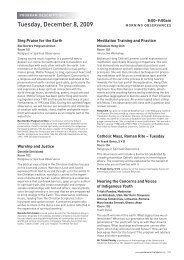Whispers and Vanities in Samoan Indigenous Religious Culture
Whispers and Vanities in Samoan Indigenous Religious Culture
Whispers and Vanities in Samoan Indigenous Religious Culture
Create successful ePaper yourself
Turn your PDF publications into a flip-book with our unique Google optimized e-Paper software.
orig<strong>in</strong>s of his residences or for the mean<strong>in</strong>gs <strong>and</strong> nuances implicit <strong>in</strong> the languag<strong>in</strong>g of<br />
family chants or songs, this Christian custodian would more often than not become<br />
uncomfortable <strong>and</strong> his whispers would start to expose the <strong>in</strong>fluence of his Christian<br />
hang-ups. In this situation the custodian’s whispered talk would move from be<strong>in</strong>g an<br />
exercise <strong>in</strong> true tala tuumumusu to one that <strong>in</strong>volves elements of taumusumusu.<br />
Although the ma<strong>in</strong> <strong>in</strong>stigator of the guilt <strong>and</strong> shame that is endemic with<strong>in</strong> this culture<br />
of whispers can be traced back to the monocultural biases of early Christian<br />
missionaries, these biases have become, as <strong>in</strong> other places, ‘<strong>in</strong>digenised.’ <strong>Samoan</strong>s<br />
now refuse, on what we perceive to be our own grounds, to enterta<strong>in</strong> the thought that<br />
maybe our forebears had someth<strong>in</strong>g useful <strong>and</strong> profound <strong>in</strong> their ancient religious<br />
beliefs <strong>and</strong> practices for our modern religious lives. While the full impact of early<br />
missionary bias among <strong>Samoan</strong>s has begun to weaken as <strong>Samoan</strong>s search <strong>and</strong> learn<br />
more about their <strong>in</strong>digenous history, we have yet to f<strong>in</strong>d a way to move beyond our<br />
August<strong>in</strong>ian guilt so that we speak of our ancient religious beliefs without fear of<br />
reprim<strong>and</strong>.<br />
To delve just a little further <strong>in</strong>to the complexity of this culture of whispers, it might be<br />
<strong>in</strong>structive to also po<strong>in</strong>t out that whisper<strong>in</strong>g <strong>in</strong> <strong>and</strong> of itself engenders exclusivity.<br />
The act of tuumumusu, while an act of reverence, is deliberately exclusive. For those<br />
not chosen to receive such knowledge there can be envy <strong>and</strong> ill-feel<strong>in</strong>g <strong>and</strong> this can<br />
give rise to taumusumusu. Dur<strong>in</strong>g ancient times pass<strong>in</strong>g on <strong>in</strong>-depth religious <strong>and</strong><br />
cultural knowledge associated with family genealogies, place names, historical<br />
figures, ceremonial rites <strong>and</strong> honorifics, <strong>in</strong>clud<strong>in</strong>g everyday practices, would fall to a<br />
select few. Such knowledge gave power <strong>and</strong> status to these custodians <strong>and</strong> especially<br />
those respected as custodians of district or national histories. The knowledge of this<br />
<strong>in</strong>ner circle of custodians was generally uncontested.<br />
The process for authenticat<strong>in</strong>g the knowledges of custodians <strong>in</strong>cluded participation <strong>in</strong><br />
rigorous debate. Custodians would meet to share <strong>and</strong> argue about different historical<br />
events, facts <strong>and</strong>/or theories. Each custodian would be obliged to prove their<br />
arguments or facts by triangulated references to known nomenclature, genealogies,<br />
historical time periods, exist<strong>in</strong>g place names, <strong>and</strong> so on. Each argument or claim of<br />
fact had to hold up aga<strong>in</strong>st common sense rules of logic <strong>and</strong> evidence. But implicit <strong>in</strong><br />
both the detail <strong>and</strong> the tell<strong>in</strong>g of all these custodial knowledges was an overrid<strong>in</strong>g<br />
belief that they were God-given; that the orig<strong>in</strong>s of all knowledges, all power <strong>and</strong><br />
status, of all that is successful <strong>and</strong> good is God-derived <strong>and</strong> God-oriented.<br />
Tala tuumumusu were <strong>and</strong> are family treasures. They def<strong>in</strong>ed family roles <strong>and</strong><br />
responsibilities with<strong>in</strong> the village, district <strong>and</strong>/or national scenes. They determ<strong>in</strong>ed<br />
political hierarchies (the boundaries <strong>and</strong> rules for claim<strong>in</strong>g authority over l<strong>and</strong>s <strong>and</strong><br />
chiefly titles). They dictated the relevance of social conventions <strong>and</strong> prescribed moral<br />
st<strong>and</strong>ards <strong>and</strong> religious norms. These knowledges <strong>and</strong> their custodians gave ancient<br />
<strong>Samoan</strong> society measures for their religious <strong>and</strong> moral life.<br />
It is not surpris<strong>in</strong>g that <strong>Samoan</strong> families, villages <strong>and</strong> districts fought over the<br />
authenticity <strong>and</strong> legitimacy of their tala tuumumusu <strong>and</strong> were wary of tala<br />
taumusumusu. Negotiat<strong>in</strong>g the boundaries between Christian <strong>and</strong> <strong>in</strong>digenous values<br />
has meant for many <strong>Samoan</strong>s a duality <strong>in</strong> the way we live our everyday lives. The<br />
culture of whispers of taumusumusu identifies the impact of European colonisation on<br />
3











